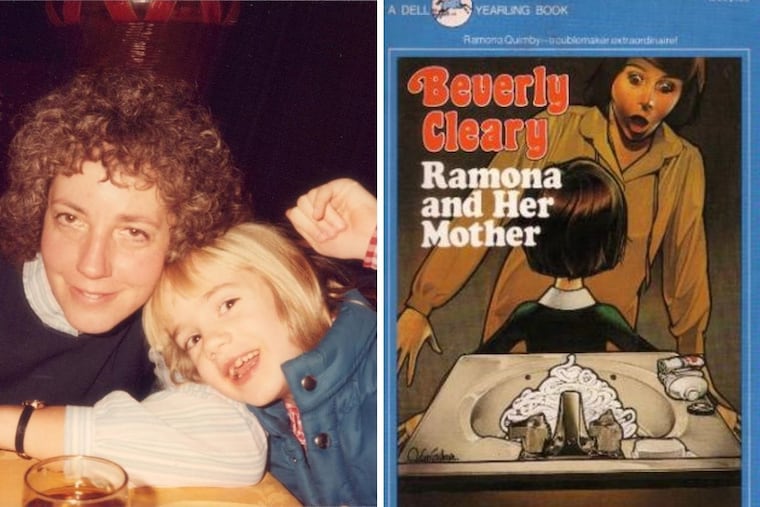‘Ramona and Her Mother’ brought me closer to my mom — now, my daughter | Opinion
Beloved author Beverly Cleary died last week, but her legacy will live on in readers like me.

When I cleaned out my mother’s house after she died in 2007, I kept only a handful of books. One was Ramona and Her Mother by Beverly Cleary, who died on Thursday at age 104. The copyright is 1979; the pages are yellowed and dog-eared, the spine peeling off.
In the book, 7-year-old Ramona Quimby wants nothing more than to feel cherished by her mother, and spend time together. But her older sister, Beezus, needs attention, too, and Ramona’s mother works long hours, so is often busy and tired. Ramona also can’t resist certain temptations, such as squeezing an entire tube of toothpaste into the sink. In the last chapter, when Ramona’s family doesn’t understand why she wore pajamas under her clothes to school (to be a firefighter, of course!), she declares she is running away.
Ramona is stunned when her mother helps her pack, placing her beloved roller skates, book, and boots in a suitcase. But when Ramona goes to lift the bag, she can’t. Her mother has made it too heavy. She looks at her mother, who says the words the little girl had longed to hear: “I couldn’t get along without my Ramona.”
» READ MORE: Beloved children’s author Beverly Cleary dies at 104
As a young reader, I deeply related to Ramona. Growing up an only child in Chestnut Hill and Wyndmoor, my happiest memories are when I had my mother all to myself — playing board games, singing in the car, and reading together. I knew my mother loved me, but she also worked long hours, including weekends. I always wanted more time alone with her, to be silly and connect.
That desire never went away. When I was 29, my mother was hospitalized at Temple University Hospital for a bad fall, and I brought Ramona and Her Mother to read to her at her bedside. The book gave me my mother all to myself, and let us shut out the worry about what was happening to her body for 208 pages. When we learned the fall was the beginning stage of ALS, I gave up my job and moved in. Often, she was too angry or sad to be silly and connect, but we had plenty of alone time while I bathed her, dressed her, and turned her limp body in the middle of the night. But it’s never enough: When she died, I kept that book out of my desperate need to have her back.
I am one of many people with deep emotional ties to the Ramona series, along with the dozens of other remarkable books by Cleary.
Unlike many children’s stories that feature supernatural powers or mythical creatures, the Quimby family is beautifully ordinary. For one entire book, Ramona’s father is out of work. Everything about their family changes: Her mother works longer hours, the girls give up the treats they used to enjoy on payday, and even the cat has to eat cheaper food. It wasn’t TV, where people often live in beautiful homes but never seem to work. Money — or a lack thereof — was a powerful, ongoing character in the Ramona books. This sunk in with me. When my father was out of work during my entire first year of college, I decided to drop out, take a job as a bank teller at PNC, and ultimately transfer to a Canadian school that was significantly cheaper. My parents didn’t ask me to do this; I just knew I should.
This speaks to the legacy of Beverly Cleary’s work, which I rediscovered when I revisited the Ramona books last month with my daughter, who is also 7. Previously, we read about kids with misfit magical powers and siblings who step through a mirror into fairy tales, but now my daughter can’t get enough of Ramona: We read the books every night, and sometimes during the day. She gets such joy out of the ordinary moments of this ordinary family’s life — Ramona is in first grade, like me! We both have a cat! I reserved the last three Ramona books from the library just hours before learning Beverly Cleary had died.
A few weeks ago, I finished Ramona and Her Mother at my daughter’s bedside, while she snuggled under her fuzzy blanket and fought to stay awake through the end. As I read the words Ramona had longed to hear from her mother, my voice cracked with emotion. Years after my mother’s death, I finally had that mother-daughter relationship back. I was just on the other side of it. I know now what my mother knew then: Even when I am working, tired, angry, or sad, my daughter is always the thing I cherish most, even if she doesn’t feel that way every minute.
Alison McCook is a journalist based in Wyncote and a commentary editor at Knowable Magazine, a science publication for a general audience.